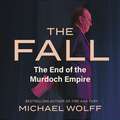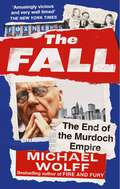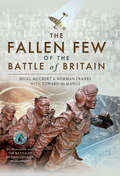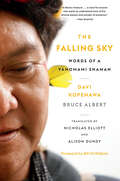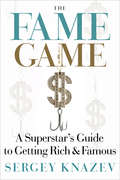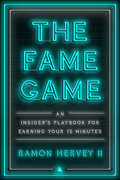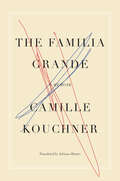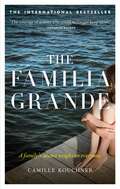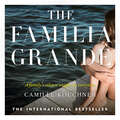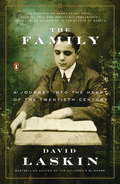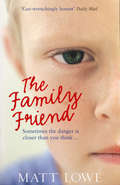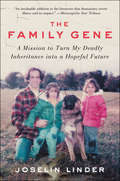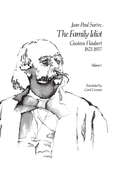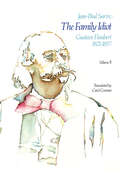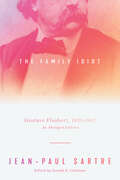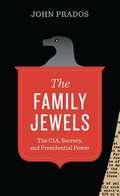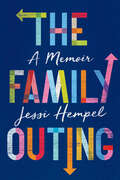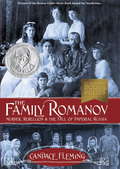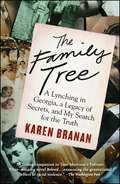- Table View
- List View
The Fall: The End of the Murdoch Empire
by Michael WolffTHE BOOK THAT BROUGHT DOWN RUPERT MURDOCH - AND A NEW YORK TIMES BESTSELLERMeet the Murdochs and the disastrously dysfunctional family of Fox News. Until recently, they formed the most powerful media and political force in America. Now their empire is cracking up and crashing down. In his irresistible trilogy on the chaotic Trump presidency - Fire and Fury, Siege, and Landslide - the journalist Michael Wolff led readers deep into the twisted corridors of the White House. Drawing on years of unprecedented access to the Murdoch family and key players, he plunges us behind the scenes of another empire of influence, and the result is astonishing and unforgettable. Here is Rupert Murdoch, the ninety-two-year-old billionaire - concerned about his legacy, but more concerned about profits. Here are his contentious children, jockeying to take over when the old man is gone. Here is star anchor Tucker Carlson considering a run for the presidency while his bosses have other plans for him. Sean Hannity, the richest man in television, has his own plans: to put Trump back in office. While presenter Laura Ingraham is just trying to survive in a man's world. As the fallout from the 2020 election and the Dominion lawsuit pummels the reputation of the network, the battling Murdoch heirs position themselves for the final act in this riveting drama."Michael Wolff's books were my foundation and port of entry for working on Succession." Jeremy Strong ("Kendall Roy")Praise for Fire and Fury:#1 New York Times bestseller, a Book of the Year in the Guardian, Sunday Times, Observer, Financial Times'The pages of Wolff's book are littered with insults and intrigue, backstabbing and dysfunction' Washington Post'What makes the book significant is its sly, hilarious portrait of a hollow man, into the black hole of whose needy, greedy ego the whole world has virtually vanished' Guardian
The Fall: The End of the Murdoch Empire
by Michael WolffTHE BOOK THAT BROUGHT DOWN RUPERT MURDOCHMeet the Murdochs and the disastrously dysfunctional family of Fox News. Until recently, they formed the most powerful media and political force in America. Now their empire is cracking up and crashing down. In his irresistible trilogy on the chaotic Trump presidency - Fire and Fury, Siege, and Landslide - the journalist Michael Wolff led readers deep into the twisted corridors of the White House. Drawing on years of unprecedented access to the Murdoch family and key players, he plunges us behind the scenes of another empire of influence, and the result is astonishing and unforgettable. Here is Rupert Murdoch, the ninety-two-year-old billionaire - concerned about his legacy, but more concerned about profits. Here are his contentious children, jockeying to take over when the old man is gone. Here is star anchor Tucker Carlson considering a run for the presidency while his bosses have other plans for him. Sean Hannity, the richest man in television, has his own plans: to put Trump back in office. While presenter Laura Ingraham is just trying to survive in a man's world. As the fallout from the 2020 election and the Dominion lawsuit pummels the reputation of the network, the battling Murdoch heirs position themselves for the final act in this riveting drama."Michael Wolff's books were my foundation and port of entry for working on Succession." Jeremy Strong ("Kendall Roy")Praise for Fire and Fury:#1 New York Times bestseller, a Book of the Year in the Guardian, Sunday Times, Observer, Financial Times'The pages of Wolff's book are littered with insults and intrigue, backstabbing and dysfunction' Washington Post'What makes the book significant is its sly, hilarious portrait of a hollow man, into the black hole of whose needy, greedy ego the whole world has virtually vanished' Guardian
The Fallen Few of the Battle of Britain
by Norman Franks Nigel McCrery Edward McManus'Never in the field of human conflict was so much owed by so many to so few' Seventy-five years on the unforgettable words of Winston Churchill ring as powerfully as they did in August 1940 when the young men of the RAF stood as the last line of defence against Hitler's far more powerful Luftwaffe.This emotional yet factual book describes the three and a half months (10 July 31 October 1940) battle day-by-day and covers the essential details of every one of the 540 young pilots who died in this critical campaign that saved Britain from invasion by the Nazis.Thanks to the authors painstaking research we are given a short biography of each pilots and learn of their actions and the manner of their deaths, their squadrons and planes.The result is a unique record and fitting memorial of the courage and sacrifice of this select band of heroes. The text is enhanced by photographs of the individuals themselves.
The Falling Sky: Words of a Yanomami Shaman
by Alison Dundy Davi Kopenawa Bruce Albert translated by Nicholas Elliott"The Falling Sky" is a remarkable first-person account of the life story and cosmo-ecological thought of Davi Kopenawa, shaman and spokesman for the Yanomami of the Brazilian Amazon. Representing a people whose very existence is in jeopardy, Davi Kopenawa paints an unforgettable picture of Yanomami culture, past and present, in the heart of the rainforest--a world where ancient indigenous knowledge and shamanic traditions cope with the global geopolitics of an insatiable natural resources extraction industry. In richly evocative language, Kopenawa recounts his initiation and experience as a shaman, as well as his first encounters with outsiders: government officials, missionaries, road workers, cattle ranchers, and gold prospectors. He vividly describes the ensuing cultural repression, environmental devastation, and deaths resulting from epidemics and violence. To counter these threats, Davi Kopenawa became a global ambassador for his endangered people. "The Falling Sky" follows him from his native village in the Northern Amazon to Brazilian cities and finally on transatlantic flights bound for European and American capitals. These travels constitute a shamanic critique of Western industrial society, whose endless material greed, mass violence, and ecological blindness contrast sharply with Yanomami cultural values. Bruce Albert, a close friend since the 1970s, superbly captures Kopenawas intense, poetic voice. This collaborative work provides a unique reading experience that is at the same time a coming-of-age story, a historical account, and a shamanic philosophy, but most of all an impassioned plea to respect native rights and preserve the Amazon rainforest.
The Falling Sky: Words of a Yanomami Shaman
by Davi Kopenawa Bruce AlbertThe 10th anniversary editionA Guardian Best Book about DeforestationA New Scientist Best Book of the YearA Taipei Times Best Book of the Year“A perfectly grounded account of what it is like to live an indigenous life in communion with one’s personal spirits. We are losing worlds upon worlds.”—Louise Erdrich, New York Times Book Review“The Yanomami of the Amazon, like all the indigenous peoples of the Americas and Australia, have experienced the end of what was once their world. Yet they have survived and somehow succeeded in making sense of a wounded existence. They have a lot to teach us.”—Amitav Ghosh, The Guardian“A literary treasure…a must for anyone who wants to understand more of the diverse beauty and wonder of existence.”—New ScientistA now classic account of the life and thought of Davi Kopenawa, shaman and spokesman for the Yanomami, The Falling Sky paints an unforgettable picture of an indigenous culture living in harmony with the Amazon forest and its creatures, and its devastating encounter with the global mining industry. In richly evocative language, Kopenawa recounts his initiation as a shaman and first experience of outsiders: missionaries, cattle ranchers, government officials, and gold prospectors seeking to extract the riches of the Amazon.A coming-of-age story entwined with a rare first-person articulation of shamanic philosophy, this impassioned plea to respect indigenous peoples’ rights is a powerful rebuke to the accelerating depredation of the Amazon and other natural treasures threatened by climate change and development.
The Fame Game: A Superstar's Guide to Getting Rich and Famous
by Sergey KnazevHollywood is where even the wildest dreams can come true no matter who you are, where you come from, or even what you know. In Hollywood, everyone is a potential star and newsstands overflow with gossip about the latest celebrity mishaps, conflicts, and achievements so that millions can live vicariously through the lives of their favorite movie stars.
The Fame Game: An Insider's Playbook for Earning Your 15 Minutes
by Ramon Hervey IILegendary Hollywood entertainment manager and publicist Ramon Hervey II shares insightful tales of his remarkable four-decade career plotting and overseeing fame, success, crisis and spinning for seminal talents at the top of their game, from Little Richard, Bette Midler, and the Bee Gees, to Aaliyah, Rick James, and Vanessa Williams—a juicy and addictive retrospective that also traces the origins of fame and how social media is changing the rules.Superstar manager and PR guru Ramon Hervey II has been playing the “fame game” for more than four decades, shaping, protecting, and sometimes rehabilitating the reputations of some of today’s biggest celebrities. Throughout his career, Hervey has mined, molded, and managed, mopped up messes, and mounted major celebrity comebacks.The Fame Game is his uncensored, behind-the-scenes look at rich and famous celebrities as they are rarely seen. Hervey shares the hilarious, the absurd, the disappointing, and the surprising as he recalls how he became a trusted confidant to a Who’s Who in music, comedy, film to A-listers including Richard Pryor, Bette Midler, Quincy Jones, Don Cornelius, the Bee Gees, Herb Alpert, Andrae Crouch, Vanessa Williams, Kenny “Babyface” Edmonds, Luther Vandross, Rick James, Paul McCartney, Peter Frampton, Andrae Crouch, Nick Nolte, James Caan, and Muhammad Ali. Filled with never-before-told anecdotes, cameos, and unforgettable stories, moving from the legendary disco era of the '70s and post-civil rights era to Hollywood soundstages, and viewed through his acute and trained lens, The Fame Game is an enlightening historical view of the origins of fame, entertainment and media that examines our obsession with fame and the famous, and how social media is cultivating is own fame—an irresistible, addictive and utterly fascinating exploration of our insatiable obsession with celebrity culture.
The Familia Grande: A Memoir
by Camille KouchnerA stunning story about finding the courage to speak out against injustice, even when committed by those closest to us.Camille Kouchner&’s childhood was marked by sun-drenched summers in the south of France, where a vibrant cast of family and friends would gather at their Sanary-sur-Mer house. This familia grande, which included much of the country&’s elite, spent memorable days and nights laughing, debating, drinking, and dancing. But a long-held secret poisoned Camille&’s memories. In February 2017, Camille returned to Sanary at forty-one to bury her mother, who died with none of her five children present. Her passing would stir up old emotions, ultimately leading Camille to publicly confront the truth. The Familia Grande poignantly explores the dynamics of abuse, and the questions of guilt and shame surrounding it. Published in France in 2021, the book sparked an important conversation about incest, and the attitudes and laws that have so often allowed influential men to evade consequences for their crimes.
The Familia Grande: A family's silence weighs on everyone
by Camille KouchnerTHE LITERARY SENSATION THAT STORMED THE WORLD, THE PHENOMENAL FRENCH BESTSELLER HAS SOLD 350,000 COPIESTHE BOOK THAT SPARKED THE VIRAL #METOOINCEST MOVEMENTA family's secret weighs on everyone...THE FAMILIA GRANDE is a tender, groundbreaking and lacerating memoir written by a sister who could no longer remain silent...Set in amongst the French intellectual elite in Paris and their lavender scented estates in Provence, it tells a story of a corrosive secret that sits in a family for decades and ultimately razes it and the political, literary elite that enabled its silence, to the ground.Already an international bestseller, it has touched a nerve across the globe and has brought about a powerful reckoning of incest, and its far-reaching trauma.The Familia Grande is a book of a generation.'The courage of a sister who could no longer keep quiet.' - EMMANUEL MACRON 'Camille's battle to liberate herself from a painful family secret has touched a nerve across France' - THE NEW YORK TIMES
The Familia Grande: A family's silence weighs on everyone
by Camille KouchnerTHE LITERARY SENSATION THAT STORMED THE WORLD,THE PHENOMENAL FRENCH BESTSELLER HAS SOLD 350,000 COPIESTHE BOOK THAT SPARKED THE VIRAL #METOOINCEST MOVEMENTA family's secret weighs on everyone...THE FAMILIA GRANDE is a tender, groundbreaking and lacerating memoir written by a sister who could no longer remain silent...Set in amongst the French intellectual elite in Paris and their lavender scented estates in Provence, it tells a story of a corrosive secret that sits in a family for decades and ultimately razes it and the political, literary elite that enabled its silence, to the ground.Already an international bestseller, it has touched a nerve across the globe and has brought about a powerful reckoning of incest, and its far-reaching trauma.The Familia Grande is a book of a generation.'The courage of a sister who could no longer keep quiet.' - EMMANUEL MACRON'Camille's battle to liberate herself from a painful family secret has touched a nerve across France' - THE NEW YORK TIMES(p) 2022 Octopus Publishing Group
The Family
by David LaskinThe author of the The Children’s Blizzard delivers an epic work of twentieth century history through the riveting story of one extraordinary Jewish family With cinematic power and beauty, bestselling author David Laskin brings to life the upheavals of the twentieth century through the story of one family, three continents, two world wars, and the rise and fall of nations. A century and a half ago, a Torah scribe and his wife raised six children in a yeshivatown at the western fringe of the Russian empire. Bound by their customs and ancient faith, the pious couple expected their sons and daughter to carry family traditions into future generations. But the social and political crises of our time decreed otherwise. The torrent of history took the scribe’s family down three very different roads. One branch immigrated to America and founded the fabulously successful Maidenform Bra Company; another went to Palestine as pioneers and participated in the contentious birth of the state of Israel; the third branch remained in Europe and suffered the onslaught of the Nazi occupation. In tracing the roots of this family-his own family-Laskin captures the epic sweep of the twentieth century. A modern-day scribe, Laskin honors the traditions, the lives, and the choices of his ancestors: revolutionaries and entrepreneurs, scholars and farmers, tycoons and truck drivers. The Family is a deeply personal, dramatic, and emotional account of people caught in a cataclysmic time in world history. .
The Family
by David LaskinThe author of the The Children's Blizzard delivers an epic work of twentieth century history through the riveting story of one extraordinary Jewish family In tracing the roots of this family--his own family--Laskin captures the epic sweep of the twentieth century. A modern-day scribe, Laskin honors the traditions, the lives, and the choices of his ancestors: revolutionaries and entrepreneurs, scholars and farmers, tycoons and truck drivers. The Family is a deeply personal, dramatic, and emotional account of people caught in a cataclysmic time in world history. A century and a half ago, a Torah scribe and his wife raised six children in a yeshivatown at the western fringe of the Russian empire. Bound by their customs and ancient faith, the pious couple expected their sons and daughter to carry family traditions into future generations. But the social and political crises of our time decreed otherwise. The torrent of history took the scribe's family down three very different roads. One branch immigrated to America and founded the fabulously successful Maidenform Bra Company; another went to Palestine as pioneers and participated in the contentious birth of the state of Israel; the third branch remained in Europe and suffered the onslaught of the Nazi occupation. With cinematic power and beauty, bestselling author David Laskin brings to life the upheavals of the twentieth century through the story of one family, three continents, two world wars, and the rise and fall of nations.
The Family Friend: Sometimes the danger is closer than you think
by Matt LoweMatt Lowe's childhood was outwardly idyllic. He was part of a large, loving family and lived comfortably on the Norfolk coast. Yet, unnoticed by his parents and peers, he was being abused by a young man who had been welcomed into the family fold...in the guise of the perfect family friend.Jeremy was intelligent, artistic and fantastic with children. A real-life Peter Pan, he was loved by the children and trusted by the adults. He was particularly fond of Matt and would organise outings and treats every weekend, just for the two of them. But from the start the relationship had a sinister side; one that Matt instinctively knew must remain hidden. Written with heart-wrenching candour, Matt's story is an unusually insightful and moving account of how one small boy endured many years of sexual and psychological abuse and how, without realising, those closest to him allowed it to happen.
The Family Gene: A Mission to Turn My Deadly Inheritance into a Hopeful Future
by Joselin LinderA riveting medical mystery about a young woman’s quest to uncover the truth about her likely fatal genetic disorder that opens a window onto the exploding field of genomic medicineWhen Joselin Linder was in her twenties her legs suddenly started to swell. After years of misdiagnoses, doctors discovered a deadly blockage in her liver. Struggling to find an explanation for her unusual condition, Joselin compared the medical chart of her father—who had died from a mysterious disease, ten years prior—with that of an uncle who had died under similarly strange circumstances. Delving further into the past, she discovered that her great-grandmother had displayed symptoms similar to hers before her death. Clearly, this was more than a fluke. Setting out to build a more complete picture of the illness that haunted her family, Joselin approached Dr. Christine Seidman, the head of a group of world-class genetic researchers at Harvard Medical School, for help. Dr. Seidman had been working on her family’s case for twenty years and had finally confirmed that fourteen of Joselin’s relatives carried something called a private mutation—meaning that they were the first known people to experience the baffling symptoms of a brand new genetic mutation. Here, Joselin tells the story of their gene: the lives it claimed and the future of genomic medicine with the potential to save those that remain. Digging into family records and medical history, conducting interviews with relatives and friends, and reflecting on her own experiences with the Harvard doctor, Joselin pieces together the lineage of this deadly gene to write a gripping and unforgettable exploration of family, history, and love. A compelling chronicle of survival and perseverance, The Family Gene is an important story of a young woman reckoning with her father’s death, her own mortality, and her ethical obligations to herself and those closest to her.
The Family Idiot: Gustave Flaubert, 1821-1857, Volume 1 (The Family Idiot #1)
by Jean-Paul SartreThat Sartre's study of Flaubert, The Family Idiot, is a towering achievement in intellectual history has never been disputed. Yet critics have argued about the precise nature of this novel, or biography, or "criticism-fiction" which is the summation of Sartre's philosophical, social, and literary thought. Sartre writes, simply, in the preface to the book: "The Family Idiot is the sequel to The Question of Method. The subject: what, at this point in time, can we know about a man? It seemed to me that this question could only be answered by studying a specific case." "A man is never an individual," Sartre writes, "it would be more fitting to call him a universal singular. Summed up and for this reason universalized by his epoch, he in turn resumes it by reproducing himself in it as singularity. Universal by the singular universality of human history, singular by the universalizing singularity of his projects, he requires simultaneous examination from both ends." This is the method by which Sartre examines Flaubert and the society in which he existed. Now this masterpiece is being made available in an inspired English translation that captures all the variations of Sartre's style—from the jaunty to the ponderous—and all the nuances of even the most difficult ideas. Volume 1 consists of Part One of the original French work, La Constitution, and is primarily concerned with Flaubert's childhood and adolescence.
The Family Idiot: Gustave Flaubert, 1821-1857, Volume 1 (The Family Idiot #1)
by Jean-Paul SartreThat Sartre's study of Flaubert, The Family Idiot, is a towering achievement in intellectual history has never been disputed. Yet critics have argued about the precise nature of this novel, or biography, or "criticism-fiction" which is the summation of Sartre's philosophical, social, and literary thought. Sartre writes, simply, in the preface to the book: "The Family Idiot is the sequel to The Question of Method. The subject: what, at this point in time, can we know about a man? It seemed to me that this question could only be answered by studying a specific case." "A man is never an individual," Sartre writes, "it would be more fitting to call him a universal singular. Summed up and for this reason universalized by his epoch, he in turn resumes it by reproducing himself in it as singularity. Universal by the singular universality of human history, singular by the universalizing singularity of his projects, he requires simultaneous examination from both ends." This is the method by which Sartre examines Flaubert and the society in which he existed. Now this masterpiece is being made available in an inspired English translation that captures all the variations of Sartre's style—from the jaunty to the ponderous—and all the nuances of even the most difficult ideas. Volume 1 consists of Part One of the original French work, La Constitution, and is primarily concerned with Flaubert's childhood and adolescence.
The Family Idiot: Gustave Flaubert, 1821-1857, Volume 5 (The Family Idiot #5)
by Jean-Paul SartreWith this volume, the University of Chicago Press completes its translation of a work that is indispensable not only to serious readers of Flaubert but to anyone interested in the last major contribution by one of the twentieth century's greatest thinkers. That Sartre's study of Flaubert, The Family Idiot, is a towering achievement in intellectual history has never been disputed. Yet critics have argued about the precise nature of this novel or biography or "criticism-fiction" which is the summation of Sartre's philosophical, social, and literary thought. In the preface, Sartre writes: "The Family Idiot is the sequel to Search for a Method. The subject: what, at this point in time, can we know about a man? It seemed to me that this question could only be answered by studying a specific case." Sartre discusses Flaubert's personal development, his relationship to his family, his decision to become a writer, and the psychosomatic crisis or "conversion" from his father's domination to the freedom of his art. Sartre blends psychoanalysis with a sociological study of the ideology of the period, the crisis in literature, and Flaubert's influence on the future of literature. While Sartre never wrote the final volume he envisioned for this vast project, the existing volumes constitute in themselves a unified work—one that John Sturrock, writing in the Observer, called "a shatteringly fertile, digressive and ruthless interpretation of these few cardinal years in Flaubert's life." "A virtuoso perfomance. . . . For all that this book does to make one reconsider his life, The Family Idiot is less a case study of Flaubert than it is a final installment of Sartre's mythology. . . . The translator, Carol Cosman, has acquitted herself brilliantly."—Frederick Brown, New York Review of Books "A splendid translation by Carol Cosman. . . . Sartre called The Family Idiot a 'true novel,' and it does tell a story and eventually reach a shattering climax. The work can be described most simply as a dialectic, which shifts between two seemingly alternative interpretations of Flaubert's destiny: a psychoanalytic one, centered on his family and on his childhood, and a Marxist one, whose guiding themes are the status of the artist in Flaubert's period and the historical and ideological contradictions faced by his social class, the bourgeoisie."—Fredric Jameson, New York Times Book Review Jean-Paul Sartre (1906-1980) was offered, but declined, the Nobel Prize for literature in 1964. His many works of fiction, drama, and philosophy include the monumental study of Flaubert, The Family Idiot, and The Freud Scenario, both published in translation by the University of Chicago Press.
The Family Idiot: Gustave Flaubert, 1821-1857, Volume 5 (The Family Idiot #5)
by Jean-Paul SartreWith this volume, the University of Chicago Press completes its translation of a work that is indispensable not only to serious readers of Flaubert but to anyone interested in the last major contribution by one of the twentieth century's greatest thinkers. That Sartre's study of Flaubert, The Family Idiot, is a towering achievement in intellectual history has never been disputed. Yet critics have argued about the precise nature of this novel or biography or "criticism-fiction" which is the summation of Sartre's philosophical, social, and literary thought. In the preface, Sartre writes: "The Family Idiot is the sequel to Search for a Method. The subject: what, at this point in time, can we know about a man? It seemed to me that this question could only be answered by studying a specific case." Sartre discusses Flaubert's personal development, his relationship to his family, his decision to become a writer, and the psychosomatic crisis or "conversion" from his father's domination to the freedom of his art. Sartre blends psychoanalysis with a sociological study of the ideology of the period, the crisis in literature, and Flaubert's influence on the future of literature. While Sartre never wrote the final volume he envisioned for this vast project, the existing volumes constitute in themselves a unified work—one that John Sturrock, writing in the Observer, called "a shatteringly fertile, digressive and ruthless interpretation of these few cardinal years in Flaubert's life." "A virtuoso perfomance. . . . For all that this book does to make one reconsider his life, The Family Idiot is less a case study of Flaubert than it is a final installment of Sartre's mythology. . . . The translator, Carol Cosman, has acquitted herself brilliantly."—Frederick Brown, New York Review of Books "A splendid translation by Carol Cosman. . . . Sartre called The Family Idiot a 'true novel,' and it does tell a story and eventually reach a shattering climax. The work can be described most simply as a dialectic, which shifts between two seemingly alternative interpretations of Flaubert's destiny: a psychoanalytic one, centered on his family and on his childhood, and a Marxist one, whose guiding themes are the status of the artist in Flaubert's period and the historical and ideological contradictions faced by his social class, the bourgeoisie."—Fredric Jameson, New York Times Book Review Jean-Paul Sartre (1906-1980) was offered, but declined, the Nobel Prize for literature in 1964. His many works of fiction, drama, and philosophy include the monumental study of Flaubert, The Family Idiot, and The Freud Scenario, both published in translation by the University of Chicago Press.
The Family Idiot: Gustave Flaubert, 1821–1857, An Abridged Edition
by Jean-Paul SartreAn approachable abridgment of Sartre’s important analysis of Flaubert. From 1981 to 1994, the University of Chicago Press published a five-volume translation of Jean-Paul Sartre’s The Family Idiot: Gustave Flaubert, 1821-1857, a sprawling masterwork by one of the greatest intellects of the twentieth century. This new volume delivers a compact abridgment of the original by renowned Sartre scholar, Joseph Catalano. Sartre claimed that his existential approach to psychoanalysis required a new Freud, and in his study of Gustave Flaubert, Sartre becomes that Freud. The work summarizes Sartre’s overarching aim to reveal that human life is a meaningful adventure of freedom. In discussing Flaubert’s work, particularly his classic novel Madame Bovary, Sartre unleashes a fierce critique of modernity as nihilistic and demeaning of human dignity.
The Family Idiot: Gustave Flaubert, 1821–1857, An Abridged Edition
by Jean-Paul SartreAn approachable abridgment of Sartre’s important analysis of Flaubert. From 1981 to 1994, the University of Chicago Press published a five-volume translation of Jean-Paul Sartre’s The Family Idiot: Gustave Flaubert, 1821-1857, a sprawling masterwork by one of the greatest intellects of the twentieth century. This new volume delivers a compact abridgment of the original by renowned Sartre scholar, Joseph Catalano. Sartre claimed that his existential approach to psychoanalysis required a new Freud, and in his study of Gustave Flaubert, Sartre becomes that Freud. The work summarizes Sartre’s overarching aim to reveal that human life is a meaningful adventure of freedom. In discussing Flaubert’s work, particularly his classic novel Madame Bovary, Sartre unleashes a fierce critique of modernity as nihilistic and demeaning of human dignity.
The Family Idiot: Gustave Flaubert, 1821–1857, An Abridged Edition
by Jean-Paul SartreAn approachable abridgment of Sartre’s important analysis of Flaubert. From 1981 to 1994, the University of Chicago Press published a five-volume translation of Jean-Paul Sartre’s The Family Idiot: Gustave Flaubert, 1821-1857, a sprawling masterwork by one of the greatest intellects of the twentieth century. This new volume delivers a compact abridgment of the original by renowned Sartre scholar, Joseph Catalano. Sartre claimed that his existential approach to psychoanalysis required a new Freud, and in his study of Gustave Flaubert, Sartre becomes that Freud. The work summarizes Sartre’s overarching aim to reveal that human life is a meaningful adventure of freedom. In discussing Flaubert’s work, particularly his classic novel Madame Bovary, Sartre unleashes a fierce critique of modernity as nihilistic and demeaning of human dignity.
The Family Jewels: The CIA, Secrecy, and Presidential Power
by John PradosIn December 1974, a front-page story in the New York Times revealed the explosive details of illegal domestic spying by the Central Intelligence Agency. This included political surveillance, eavesdropping, detention, and interrogation. The revelation of illegal activities over many years shocked the American public and led to investigations of the CIA by a presidential commission and committees in both houses of Congress, which found evidence of more abuse, even CIA plans for assassinations. Investigators and the public soon discovered that the CIA abuses were described in a top-secret document agency insiders dubbed the "Family Jewels. " That document became ground zero for a political firestorm that lasted more than a year. The "Family Jewels" debacle ultimately brought about greater congressional oversight of the CIA, but excesses such as those uncovered in the 1970s continue to come to light. The Family Jewels probes the deepest secrets of the CIA and its attempts to avoid scrutiny. John Prados recounts the secret operations that constituted "Jewels" and investigators' pursuit of the truth, plus the strenuous efforts-by the agency, the executive branch, and even presidents-to evade accountability. Prados reveals how Vice President Richard Cheney played a leading role in intelligence abuses and demonstrates that every type of "Jewel" has been replicated since, especially during the post-9/11 war on terror. The Family Jewels masterfully illuminates why these abuses are endemic to spying, shows that proper relationships are vital to control of intelligence, and advocates a system for handling "Family Jewels" crises in a democratic society.
The Family Outing: A Memoir
by Jessi Hempel“Fascinating, funny, and wise, The Family Outing is an affirmation to all of us who know the pain and shame of hiding our truest self, and a stirring invitation into the courage, freedom, and joy of living our whole truth.”—Glennon Doyle, author of #1 New York Times bestseller Untamed, founder of Together RisingA striking and remarkable literary memoir about one family’s transformation, with almost all of them embracing their queer identities.Jessi Hempel was raised in a seemingly picture-perfect, middle-class American family. But the truth was far from perfect. Her father was constantly away from home, traveling for work, while her stay-at-home mother became increasingly lonely and erratic. Growing up, Jessi and her two siblings struggled to make sense of their family, their world, their changing bodies, and the emotional turmoil each was experiencing. And each, in their own way, was hiding their true self from the world.By the time Jessi reached adulthood, everyone in her family had come out: Jessi as gay, her sister as bisexual, her father as gay, her brother as transgender, and her mother as a survivor of a traumatic experience with an alleged serial killer. Yet coming out was just the beginning, starting a chain reaction of other personal revelations and reckonings that caused each of them to question their place in the world in new and ultimately liberating ways.
The Family Romanov: Murder, Rebellion, and the Fall of Imperial Russia
by Candace Fleming"Marrying the intimate family portrait of Heiligman's Charles and Emma with the politics and intrigue of Sheinkin's Bomb, Fleming has outdone herself with this riveting work of narrative nonfiction that appeals to the imagination as much as the intellect." --The Horn Book, StarredFrom the acclaimed author of Amelia Lost and The Lincolns comes a heartrending narrative nonfiction page-turner--and a perfect resource for meeting Common Core standards. When Russia's last tsar, Nicholas II, inherited the throne in 1894, he was unprepared to do so. With their four daughters (including Anastasia) and only son, a hemophiliac, Nicholas and his reclusive wife, Alexandra, buried their heads in the sand, living a life of opulence as World War I raged outside their door and political unrest grew into the Russian Revolution.Deftly maneuvering between the lives of the Romanovs and the plight of Russia's peasants and urban workers--and their eventual uprising--Fleming offers up a fascinating portrait, complete with inserts featuring period photographs and compelling primary-source material that brings it all to life."An exhilarating narrative history of a doomed and clueless family and empire." --Jim Murphy, author of Newbery Honor Books An American Plague and The Great Fire"For readers who regard history as dull, Fleming's extraordinary book is proof positive that, on the contrary, it is endlessly fascinating, absorbing as any novel, and the stuff of an altogether memorable reading experience." --Booklist, Starred<P><P> Winner of the Sibert Honor
The Family Tree
by Karen BrananIn the tradition of Slaves in the Family, the provocative true account of the hanging of four black people by a white lynch mob in 1912--written by the great-granddaughter of the sheriff charged with protecting them.Harris County, Georgia, 1912. A white man, the beloved nephew of the county sheriff, is shot dead on the porch of a black woman. Days later, the sheriff sanctions the lynching of a black woman and three black men, all of them innocent. For Karen Branan, the great-granddaughter of that sheriff, this isn't just history, this is family history. Branan spent nearly twenty years combing through diaries and letters, hunting for clues in libraries and archives throughout the United States, and interviewing community elders to piece together the events and motives that led a group of people to murder four of their fellow citizens in such a brutal public display. Her research revealed surprising new insights into the day-to-day reality of race relations in the Jim Crow-era South, but what she ultimately discovered was far more personal. As she dug into the past, Branan was forced to confront her own deep-rooted beliefs surrounding race and family, a process that came to a head when Branan learned a shocking truth: she is related not only to the sheriff, but also to one of the four who were murdered. Both identities--perpetrator and victim--are her inheritance to bear. A gripping story of privilege and power, anger, and atonement, The Family Tree transports readers to a small Southern town steeped in racial tension and bound by powerful family ties. Branan takes us back in time to the Civil War, demonstrating how plantation politics and the Lost Cause movement set the stage for the fiery racial dynamics of the twentieth century, delving into the prevalence of mob rule, the rise of the Ku Klux Klan and the role of miscegenation in an unceasing cycle of bigotry. Through all of this, what emerges is a searing examination of the violence that occurred on that awful day in 1912--the echoes of which still resound today--and the knowledge that it is only through facing our ugliest truths that we can move forward to a place of understanding.
